TERENCE BLANCHARD / “Ghost of Congo Square”
“This moment must be seen, has to be seen by those people around the world who don't know what has happened here. What is happening here. Yes. Still.” —Terence BlanchardTerence has sneaked up on me when I wasn't paying a whole lot of attention. I’ve known him for a long time. Literally. Always knew he was talented. Always kind of liked him whenever I heard him but never really went out of my way to dig his music. Didn’t have to; what with all the soundtrack music he was doing he was kind of in my ears a lot even when I wasn’t paying a lot of attention. Like when he scored that Don Cheadle movie Talk To Me. My wife Nia and I are usually among the last to leave as we tend to watch until the credits stop rolling. At the end of Talk To Me there was Me’Shell Ndegeocello doing a version of “Compared To What” in her own immediately recognizable style (available on the Talk To Me Soundtrack).
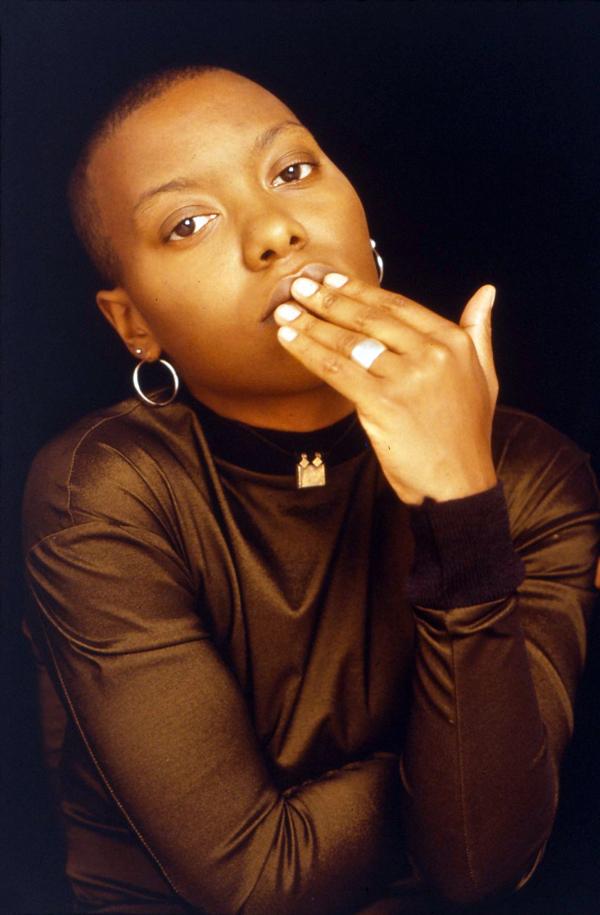 When Me’Shell starts that talk-singing she does, a slow roll over a funky rhythm, she immediately gets your attention like when an intimate whispers some wonderfully nasty stuff into your earhole, so close to you, you can feel their breath on your skin.
Moreover, even uptempo Me’Shell sounds like she’s on a slow roll, not like she drawls or anything but more like she’s too cool to rush. Anyway, soon as I heard her I sat back and my ears perked up. Then the trumpet solo started and I kind of liked it. By the end of the song I was smiling. The credits told me Terence had done the music. I said: alright, that’s cool.
When Me’Shell starts that talk-singing she does, a slow roll over a funky rhythm, she immediately gets your attention like when an intimate whispers some wonderfully nasty stuff into your earhole, so close to you, you can feel their breath on your skin.
Moreover, even uptempo Me’Shell sounds like she’s on a slow roll, not like she drawls or anything but more like she’s too cool to rush. Anyway, soon as I heard her I sat back and my ears perked up. Then the trumpet solo started and I kind of liked it. By the end of the song I was smiling. The credits told me Terence had done the music. I said: alright, that’s cool.
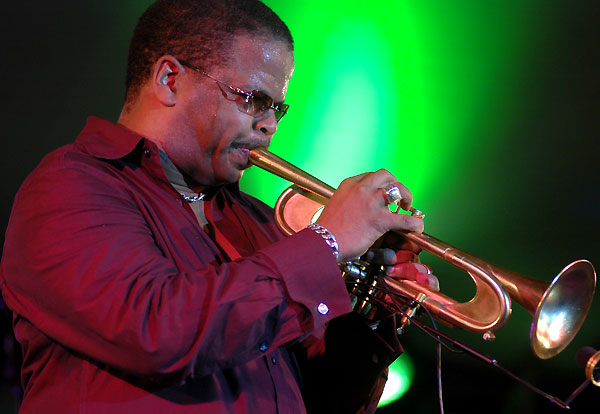 Now Terence’s new album is out. His Katrina album. I’m hooked. My brother Kenneth, who is a business owner, business administrator, but most importantly a New Orleans trumpet player, has been trying to hip me to Terence. Kenneth is right, Terence is terrible—and I mean that in a good way.
I’ve got a moving van full of mixed feelings about living in New Orleans post-Katrina. I’ve heard all kinds of Katrina tributes, memorials, dedications, raps, whoops, hollers and what not. But this is the first one that hits me in the place where my rueful confusion mates with an almost cynical sadness; the place where hope gets slapped around, violently, by reality; the place where I see so much wrong and right looks like an almost insignificant sliver of wood I’m grabbing at to keep from going under. And there ain’t much right going down; just enough to keep us alive if we swim real fast, real hard and don’t give up. I guess you’d have to be here to understand.
I try not to linger too long in my interior emotional rooms; when you focus too much on our current reality, well, it can scare you, i.e. you can scare yourself. Usually I stick to the places we’ve been fixing up, the places where the lights work and the water works and nobody is shooting and sometimes there is even laughter; the place where a lot of the young people are. But it’s like trying to stay awake to avoid nightmares. Sooner or later you fall asleep, and when you do, reality mugs you.
A Tale of God’s Will is almost hypnotic. It will make you see and hear and feel things that are not there. Old New Orleans is not here anymore. Genuine joy only passes through at a fast clip, touching down for but the briefest of moments.
But there is also a strength here. The strength of holding on even it’s only a straw’s worth of good times keeping us afloat. We be some water-treading motherfuckers.
If you put this recording on and turn out the lights, you will get an inkling of what I’m talking about. There are upful moments but there is also a deep recognition of the dark that is tainted by the ashes of despair. A recognition of how much has been damaged, lost, destroyed. It’s two years later and we still have more houses unrepaired than we have homes that have been fixed up. Less than half of the flooded areas have been put back on their feet. Much less than half.
This music captures that.
It’s not a sad record. It’s just a truthful record and the truth about New Orleans has a lot of sadness in it. But we’re survivors. One way or another. We’re going to survive until we die. That’s in this music too.
Now Terence’s new album is out. His Katrina album. I’m hooked. My brother Kenneth, who is a business owner, business administrator, but most importantly a New Orleans trumpet player, has been trying to hip me to Terence. Kenneth is right, Terence is terrible—and I mean that in a good way.
I’ve got a moving van full of mixed feelings about living in New Orleans post-Katrina. I’ve heard all kinds of Katrina tributes, memorials, dedications, raps, whoops, hollers and what not. But this is the first one that hits me in the place where my rueful confusion mates with an almost cynical sadness; the place where hope gets slapped around, violently, by reality; the place where I see so much wrong and right looks like an almost insignificant sliver of wood I’m grabbing at to keep from going under. And there ain’t much right going down; just enough to keep us alive if we swim real fast, real hard and don’t give up. I guess you’d have to be here to understand.
I try not to linger too long in my interior emotional rooms; when you focus too much on our current reality, well, it can scare you, i.e. you can scare yourself. Usually I stick to the places we’ve been fixing up, the places where the lights work and the water works and nobody is shooting and sometimes there is even laughter; the place where a lot of the young people are. But it’s like trying to stay awake to avoid nightmares. Sooner or later you fall asleep, and when you do, reality mugs you.
A Tale of God’s Will is almost hypnotic. It will make you see and hear and feel things that are not there. Old New Orleans is not here anymore. Genuine joy only passes through at a fast clip, touching down for but the briefest of moments.
But there is also a strength here. The strength of holding on even it’s only a straw’s worth of good times keeping us afloat. We be some water-treading motherfuckers.
If you put this recording on and turn out the lights, you will get an inkling of what I’m talking about. There are upful moments but there is also a deep recognition of the dark that is tainted by the ashes of despair. A recognition of how much has been damaged, lost, destroyed. It’s two years later and we still have more houses unrepaired than we have homes that have been fixed up. Less than half of the flooded areas have been put back on their feet. Much less than half.
This music captures that.
It’s not a sad record. It’s just a truthful record and the truth about New Orleans has a lot of sadness in it. But we’re survivors. One way or another. We’re going to survive until we die. That’s in this music too.
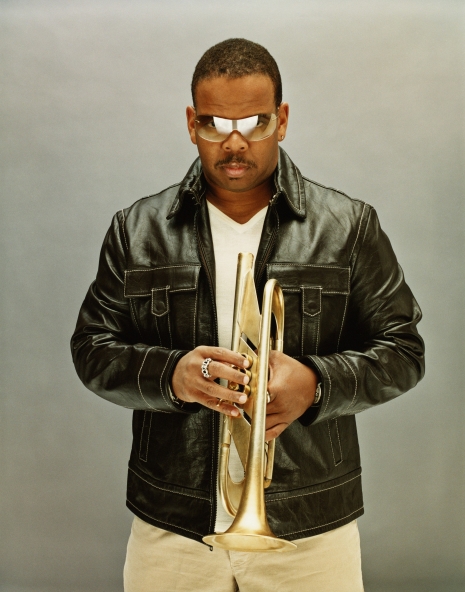 Terence is a bad somebody.
Terence's trumpet sound is bitter-sweet. A tart tone that is both rich and restrained. His sound is big, round and fat even when he does the grace notes and half valve effects. Even as he glisses upward on selected notes, or bends and bops across the drum rhythms. His sound might be clear-eyed but you can tell he has cried a lot. You’d have to have been raised here to see what we see when we look at the way New Orleans is now ‘cause we don’t just see now, we also see then.
Terence has been looking closely at our city. So, that’s one thing you notice the beauty of his trumpet work on an intimate level. You never get the feeling he is showing off for anyone. In fact sometimes it even sounds like we’re eavesdropping on a man talking to himself, or praying to a god for understanding of why this disaster was allowed to happen.
Terence is a bad somebody.
Terence's trumpet sound is bitter-sweet. A tart tone that is both rich and restrained. His sound is big, round and fat even when he does the grace notes and half valve effects. Even as he glisses upward on selected notes, or bends and bops across the drum rhythms. His sound might be clear-eyed but you can tell he has cried a lot. You’d have to have been raised here to see what we see when we look at the way New Orleans is now ‘cause we don’t just see now, we also see then.
Terence has been looking closely at our city. So, that’s one thing you notice the beauty of his trumpet work on an intimate level. You never get the feeling he is showing off for anyone. In fact sometimes it even sounds like we’re eavesdropping on a man talking to himself, or praying to a god for understanding of why this disaster was allowed to happen.
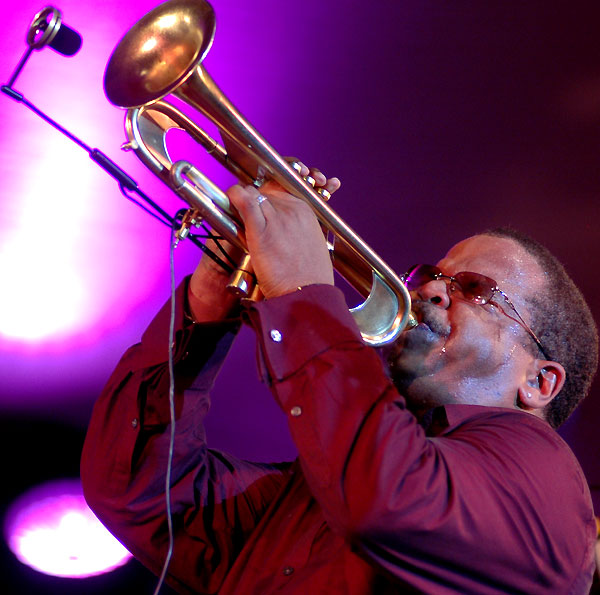 I like all of Terence’s trumpet solos on this record. No, that’s not quite right—it’s not even much about liking or disliking. I feel all of the trumpet solos. I have felt what he is playing.
Terence also got some Jelly Roll Morton in him. I’m referring to the tradition of New Orleans composers. Born March 13, 1962, Terence started playing piano at age five and spent a number of years studying with Roger Dickerson, a New Orleans composer who wrote classical music and also played solo jazz and pop piano in hotels.
Terence is a top drawer composer but he works his compositional magic in the background, probably as a result of doing so many film scores. He is undoubtedly the leading black composer of Hollywood film soundtracks. No young musician ('young' for New Orleans musicians equals under fifty) is even close to Terence’s current accomplishments in that arena—Terence has composed 41 film scores! Clearly Terence has truly learned to establish moods, evoke emotions. All the techniques and understandings Terence garnered from his film-scoring career is employed on A Tale of God’s Will.
The line up is: Terence Blanchard: trumpet
; Brice Winston: tenor and soprano saxophones;
Aaron Parks: piano;
Derrick Hodge: acoustic and electric basses
; Zach Harmon: tabla and the happy apple;
The Northwest Sinfonia conducted by Terence Blanchard;
Simon James: contractor and concertmaster.
I really appreciate how seamless this record sounds. Parts of it feature Terence's jazz combo. Parts of it are suffused with strings. Four of the tracks were written by different members of Terence’s combo. You’d be hard pressed to tell one composer from another even though there is a wide stylistic variety from track to track. It’s all in the arranging touch—which is what Jelly Roll was also a master of. Terence can start with one sound and before the song is over included a whole orchestra and then end up with a trumpet solo, or some other mix of sounds, and it not only makes sense it just seems to fuse into a smooth wholeness.
I like all of Terence’s trumpet solos on this record. No, that’s not quite right—it’s not even much about liking or disliking. I feel all of the trumpet solos. I have felt what he is playing.
Terence also got some Jelly Roll Morton in him. I’m referring to the tradition of New Orleans composers. Born March 13, 1962, Terence started playing piano at age five and spent a number of years studying with Roger Dickerson, a New Orleans composer who wrote classical music and also played solo jazz and pop piano in hotels.
Terence is a top drawer composer but he works his compositional magic in the background, probably as a result of doing so many film scores. He is undoubtedly the leading black composer of Hollywood film soundtracks. No young musician ('young' for New Orleans musicians equals under fifty) is even close to Terence’s current accomplishments in that arena—Terence has composed 41 film scores! Clearly Terence has truly learned to establish moods, evoke emotions. All the techniques and understandings Terence garnered from his film-scoring career is employed on A Tale of God’s Will.
The line up is: Terence Blanchard: trumpet
; Brice Winston: tenor and soprano saxophones;
Aaron Parks: piano;
Derrick Hodge: acoustic and electric basses
; Zach Harmon: tabla and the happy apple;
The Northwest Sinfonia conducted by Terence Blanchard;
Simon James: contractor and concertmaster.
I really appreciate how seamless this record sounds. Parts of it feature Terence's jazz combo. Parts of it are suffused with strings. Four of the tracks were written by different members of Terence’s combo. You’d be hard pressed to tell one composer from another even though there is a wide stylistic variety from track to track. It’s all in the arranging touch—which is what Jelly Roll was also a master of. Terence can start with one sound and before the song is over included a whole orchestra and then end up with a trumpet solo, or some other mix of sounds, and it not only makes sense it just seems to fuse into a smooth wholeness.
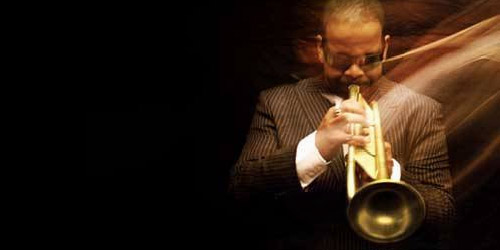 None of this music sounds like what most non-New Orlenians think of when one says New Orleans music. All this music sounds like what New Orleans looks like two years after Katrina. Terence has nailed it down not by focusing on what was but instead by invoking what is and what is (as we say in New Orleans slang) ain’t nothing nice.
New Orleans has a strong Roman Catholic tradition and in that tradition a requiem is a Mass for the repose of the souls of the dead. Terence is not just for the souls of the individuals who died but also a plangent lament for the soul of a city struggling hard to survive. This is more than whatever people generally mean when they say music. This is a religious experience that even a pagan like me can appreciate.
Some of this music was written specifically for and used in Spike Lee’s New Orleans documentary, When The Levees Broke. It’s almost like Terence shot another documentary, and I guess, truth be told, Terence did make his own movie. His eyeballs was his camera. His heart the screen room. And from the very breath of his body he exhaled the soundtrack. This is A Tale of God’s Will as Terence is my witness. Amen, my brother, amen.
—Kalamu ya Salaam
None of this music sounds like what most non-New Orlenians think of when one says New Orleans music. All this music sounds like what New Orleans looks like two years after Katrina. Terence has nailed it down not by focusing on what was but instead by invoking what is and what is (as we say in New Orleans slang) ain’t nothing nice.
New Orleans has a strong Roman Catholic tradition and in that tradition a requiem is a Mass for the repose of the souls of the dead. Terence is not just for the souls of the individuals who died but also a plangent lament for the soul of a city struggling hard to survive. This is more than whatever people generally mean when they say music. This is a religious experience that even a pagan like me can appreciate.
Some of this music was written specifically for and used in Spike Lee’s New Orleans documentary, When The Levees Broke. It’s almost like Terence shot another documentary, and I guess, truth be told, Terence did make his own movie. His eyeballs was his camera. His heart the screen room. And from the very breath of his body he exhaled the soundtrack. This is A Tale of God’s Will as Terence is my witness. Amen, my brother, amen.
—Kalamu ya Salaam
I really feel it As soon as I heard "Mantra" I knew I was going to like this. The tone is.... Well, Kalamu described it well. I really like that Terrence didn't go for this whole ultra-dramatic, sorrowful, the-world-is-ending vibe. At the same time, he didn't do the 'I'm ridiculously optimistic and we're going to be A-OK' thing either. This music sounds like good advice from an elder. Like the kind of thing that doesn't necessarily overwhelm you in the moment, but as time passes, becomes more and more significant. The only criticism I have for the pieces is that some of them seem to work only at the beginning. Every one of them grabs me at the beginning, but some of them eventually seem to meander. I'm sure some of that is the nature of the beast—it's soundtrack music; perhaps not intended to be listened to in and of itself. But there are other times when the music just carries me, and I really feel it all the way to the end. (By the way, why is "Ghost Of 1927" so short? That was one shaping up to be my favorite selection.) Oh, and uh, the Meshell is fantastic. (Sometimes I feel dumb when I compliment Meshell's work because I do it so often. Just type her name in our search box and you'll see what I mean.) Meshell is a specialist at making a familiar lyric sound mysterious. I came away from her reading of "Compared To What," a song that has been covered more than a few times too many, feeling like I'd just heard it for the first time. —Mtume ya Salaam Just a reminder Mtume, don't forget some of the music is taken from the soundtrack for Spike's documentary and thus was made to fit a specific length, which could have been short or stretched out long. And just for clarity's sake: "Mantra" may have been the first song of this batch to pop up on your i-Pod, but "Mantra" is not the first song of the album. And as for Meshell, I'm going to quote P-Funk: "Badddddd, the girl is baddddddd!!!!" —Kalamu
This entry was posted on Saturday, October 6th, 2007 at 11:51 pm and is filed under Contemporary. You can follow any responses to this entry through the RSS 2.0 feed. You can leave a response, or trackback from your own site.
3 Responses to “TERENCE BLANCHARD / “Ghost of Congo Square””
October 7th, 2007 at 7:21 am
I feel, hear and see what you’re saying my brother. i live in belize as a child and left in the aftermath of hurricane janet in 1961. u have to live through something like that to appreciate what went down in new orleans. the difference for us in belize is that the racism is not as immediately lethal as in the u.s.a
October 9th, 2007 at 7:36 am
Been meaning to get into MeShell for a while (can’t do everything!) so thanks for this brief intro. (I know, I should have been connected here long ago.) Like her singing; not so keen on the backing – seems a bit too fussy for the song, which should be loud and clear – louder and clearer. (I saw Gene McDaniels stop a Rock concert dead in 1962, singing “Spring is here”.)
I’m listening now to the Blanchard – ANOTHER I haven’t got round to yet (though I thought I had something as a sideman but can’t track it/them down)and so yet another thanks (good week this). I think I could live with some Blanchard albums. Perhaps not this one to start off with – perhaps something more conventional. Any ideas?
Lunchime, so I’ll quit for a while after “Mantra” finishes.
MG
June 23rd, 2008 at 12:20 pm
I am trying to find out the name of the piece on the movie Talk to Me; at the end it’s a strong trumpet piece I think is terrance blandard; it’s when ” Mr. Hughes and Petey are walking in the park at the end being film by verdell” does anymore knows who that piece is by and if so what’s the name of it.
Leave a Reply
| top |